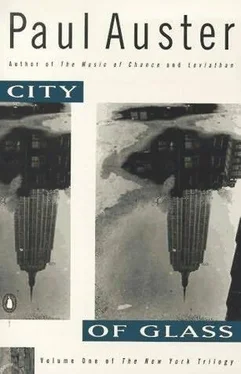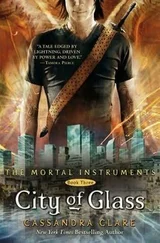Paul Auster - City of Glass
Здесь есть возможность читать онлайн «Paul Auster - City of Glass» весь текст электронной книги совершенно бесплатно (целиком полную версию без сокращений). В некоторых случаях можно слушать аудио, скачать через торрент в формате fb2 и присутствует краткое содержание. Жанр: Современная проза, на английском языке. Описание произведения, (предисловие) а так же отзывы посетителей доступны на портале библиотеки ЛибКат.
- Название:City of Glass
- Автор:
- Жанр:
- Год:неизвестен
- ISBN:нет данных
- Рейтинг книги:5 / 5. Голосов: 1
-
Избранное:Добавить в избранное
- Отзывы:
-
Ваша оценка:
- 100
- 1
- 2
- 3
- 4
- 5
City of Glass: краткое содержание, описание и аннотация
Предлагаем к чтению аннотацию, описание, краткое содержание или предисловие (зависит от того, что написал сам автор книги «City of Glass»). Если вы не нашли необходимую информацию о книге — напишите в комментариях, мы постараемся отыскать её.
City of Glass — читать онлайн бесплатно полную книгу (весь текст) целиком
Ниже представлен текст книги, разбитый по страницам. Система сохранения места последней прочитанной страницы, позволяет с удобством читать онлайн бесплатно книгу «City of Glass», без необходимости каждый раз заново искать на чём Вы остановились. Поставьте закладку, и сможете в любой момент перейти на страницу, на которой закончили чтение.
Интервал:
Закладка:
"That's just the trouble. I thought I was."
"It's not too late now, is it?"
"No. There's still plenty of time. I don't want you to worry."
"I'll try not to."
"Good. I'll be in touch."
"Every two hours?"
"Every two hours."
He had finessed the conversation rather nicely. In spite of everything, he had managed to keep Virginia Stillman calm. He found it hard to believe, but she still seemed to trust him. Not that it would be of any help. For the fact was, he had lied to her. He did not have several ideas. He did not have even one.
10
STILLMAN was gone now. The old man had become part of the city. He was a speck, a punctuation mark, a brick in an endless wall of bricks. Quinn could walk through the streets every day for the rest of his life, and still he would not find him. Everything had been reduced to chance, a nightmare of numbers and probabilities. There were no clues, no leads, no moves to be made.
Quinn backtracked in his mind to the beginning of the case. His job had been to protect Peter, not to follow Stillman. That had simply been a method, a way of trying to predict what would happen. By watching Stillman, the theory was that he would learn what his intentions were toward Peter. He had followed the old man for two weeks. What, then, could he conclude? Not much. Stillman's behavior had been too obscure to give any hints.
There were, of course, certain extreme measures that they could take. He could suggest to Virginia Stillman that she get an unlisted telephone number. That would eliminate the disturbing calls, at least temporarily. If that failed, she and Peter could move. They could leave the neighborhood, perhaps leave the city altogether. At the very worst, they could take on new identities, live under different names.
This last thought reminded him of something important. Until now, he realized, he had never seriously questioned the circumstances of his hiring. Things had happened too quickly, and he had taken it for granted that he could fill in for Paul Auster. Once he had taken the leap into that name, he had stopped thinking about Auster himself. If this man was as good a detective as the Stillmans thought he was, perhaps he would be able to help with the case. Quinn would make a clean breast of it, Auster would forgive him, and together they would work to save Peter Stillman.
He looked through the yellow pages for the Auster Detective Agency. There was no listing. In the white pages, however, he found the name. There was one Paul Auster in Manhattan, living on Riverside Drive -not far from Quinn's own house. There was no mention of a detective agency, but that did not necessarily mean anything. It could be that Auster had so much work he didn't need to advertise. Quinn picked up the phone and was about to dial when he thought better of it. This was too important a conversation to leave to the phone. He did not want to run the risk of being brushed off. Since Auster did not have an office, that meant he worked at home. Quinn would go there and talk to him face to face.
The rain had stopped now, and although the sky was still gray, far to the west Quinn. could see a tiny shaft of light seeping through the clouds. As he walked up Riverside Drive, he became aware of the fact that he was no longer following Stillman. It felt as though he had lost half of himself. For two weeks he had been tied by an invisible thread to the old man. Whatever Stillman had done, he had done; wherever Stillman had gone, he had gone. His body was not accustomed to this new freedom, and for the first few blocks he walked at the old shuffling pace. The spell was over, and yet his body did not know it.
Auster’s building was in the middle of the long block that ran between 116th and 119th Streets, just south of Riverside Church and Grant's Tomb. It was a well-kept place, with polished doorknobs and clean glass, and it had an air of bourgeois sobriety that appealed to Quinn at that moment. Auster's apartment was on the eleventh floor, and Quinn ran the buzzer, expecting to hear a voice speak to him through the intercom. But the door buzzer answered him without any conversation. Quinn pushed the door open, walked.through the lobby, and rode the elevator to the eleventh floor.
It was a man who opened the apartment door. He was a tall dark fellow in his mid-thirties, with rumpled clothes and a two-day beard. In his right hand, fixed between his thumb and first two fingers, he held an uncapped fountain pen, still poised in a writing position. The man seemed surprised to find a stranger standing before him.
"Yes?" he asked tentatively.
Quinn spoke in the politest tone he could muster. "Were you expecting someone else?"
"My wife, as a matter of fact. That's why I rang the buzzer without asking who it was."
"I'm sorry to disturb you," Quinn apologized. "But I'm looking for Paul Auster."
"I'm Paul Auster," said the man.
"I wonder if I could talk to you. It's quite important."
"You'll have to tell me what it's about first."
"I hardly know myself" Quinn gave Auster an earnest look. 'It's complicated, I'm afraid. Very complicated."
"Do you have a name?"
"I'm sorry. Of course I do. Quinn."
"Quinn what?"
"Daniel Quinn."
The name seemed to suggest something to Auster, and he paused for a moment abstractedly, as if searching through his memory. "Quinn," he muttered to himself "I know that name from somewhere." He went silent again, straining harder to dredge up the answer. "You aren't a poet, are you?"
“I used to be," said Quinn. "But I haven't written poems for a long time now."
"You did a book several years ago, didn't you? I think the title was Unfinished Business. A little book with a blue cover."
"Yes. That was me."
“I liked it very much. I kept hoping to see more of your work. In fact, I even wondered what had happened to you."
“I'm still here. Sort of."
Auster opened the door wider and gestured for Quinn to enter the apartment. It was a pleasant enough place inside: oddly shaped, with several long corridors, books cluttered everywhere, pictures on the walls by artists Quinn did not know, and a few children's toys scattered on the floor-a red truck, a brown bear, a green space monster. Auster led him to the living room, gave him a frayed upholstered chair to sit in, and then went off to the kitchen to fetch some beer. He returned with two bottles, placed them on a wooden crate that served as the coffee table, and sat down on the sofa across from Quinn.
"Was it some kind of literary thing you wanted to talk about?" Auster began.
"No," said Quinn. "I wish it was. But this has nothing to do with literature."
“With what, then?"
Quinn paused, looked around the room without seeing anything, and tried to start. "I have a feeling there's been a terrible mistake. I came here looking for Paul Auster, the private detective."
"The what?" Auster laughed, and in that laugh everything was suddenly blown to bits. Quinn realized that he was talking nonsense. He might just as well have asked for Chief Sitting Bull-the effect would have been no different.
"The private detective," he repeated softly.
"I'm afraid you've got the wrong Paul Auster."
"You're the only one in the book."
"That might be," said Auster. "But I'm not a detective."
"Who are you then? What do you do?"
"I'm a writer."
"A writer?" Quinn spoke the word as though it were a lament.
"I'm sorry," Auster said. "But that's what I happen to be."
"If that's true, then there's no hope. The whole thing is a bad dream."
"I have no idea what you're talking about."
Quinn told him. He began at the beginning and went through the entire story, step by step. The pressure had been building up in him since Stillman's disappearance that morning, and it came out of him now as a torrent of words. He told of the phone calls for Paul Auster, of his inexplicable acceptance of the case, of his meeting with Peter Stillman, of his conversation with Virginia Stillman, of his reading Stillman's book, of his following Stillman from Grand Central Station, of Stillman's daily wanderings, of the carpetbag and the broken objects, of the disquieting maps that formed letters of the alphabet, of his talks with Stillman, of Stillman's disappearance from the hotel. When he had come to the end, he said, "Do you think I'm crazy?"
Читать дальшеИнтервал:
Закладка:
Похожие книги на «City of Glass»
Представляем Вашему вниманию похожие книги на «City of Glass» списком для выбора. Мы отобрали схожую по названию и смыслу литературу в надежде предоставить читателям больше вариантов отыскать новые, интересные, ещё непрочитанные произведения.
Обсуждение, отзывы о книге «City of Glass» и просто собственные мнения читателей. Оставьте ваши комментарии, напишите, что Вы думаете о произведении, его смысле или главных героях. Укажите что конкретно понравилось, а что нет, и почему Вы так считаете.












